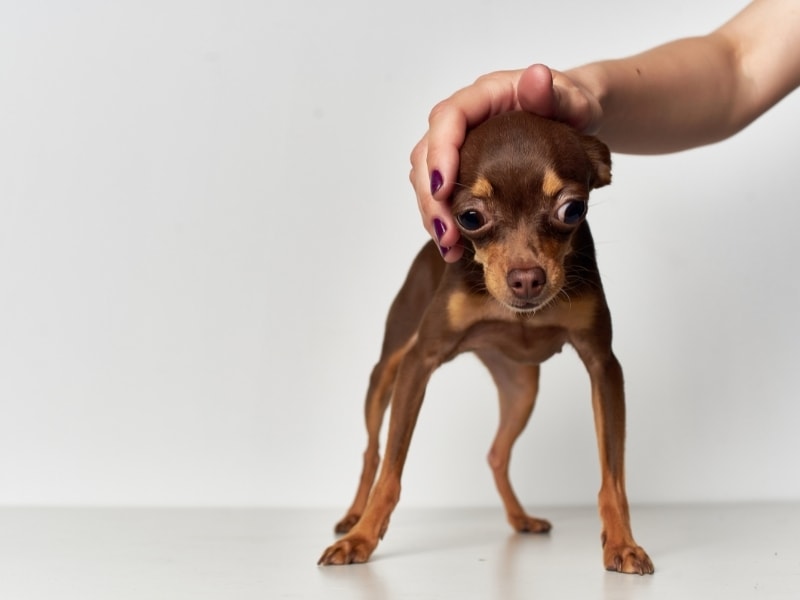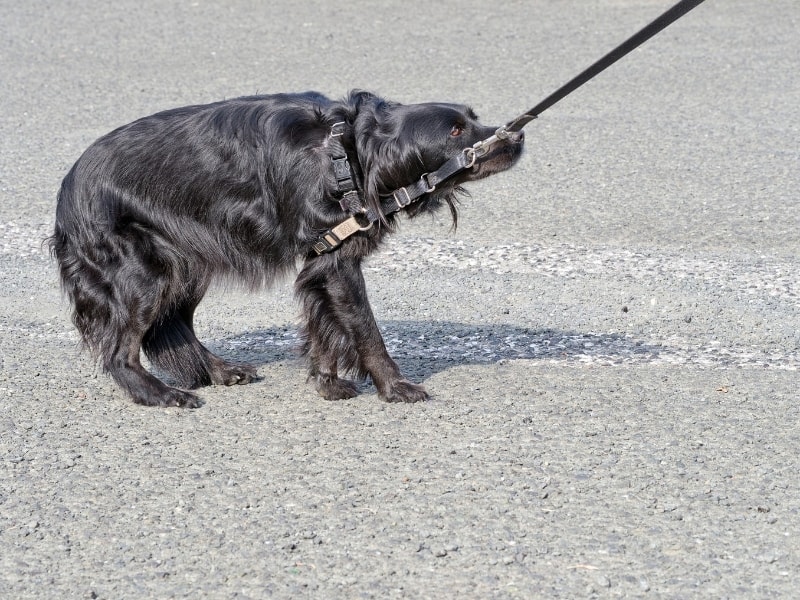Have you adopted a new puppy that’s afraid of everything? Or is your dog of many years suddenly scared of you? Besides being heartbreaking to see, having a dog that is afraid of you also makes training, grooming, and feeding a real challenge.
If this is the case you may wonder, why is my dog scared of me? There are several reasons why your dog is suddenly afraid of you. Your dog’s fear is most likely caused by negative experiences, including past trauma or punishment. Punishment can come in many forms such as scolding, yelling, or hitting. Other factors include old age, neutering, and genetics.
If your dog is afraid of you, keep on reading! In this article, we’ll list the most common reasons for your dog’s fear and give you helpful tips on what to do to (re)gain your dog’s trust!
Reasons Why Your Dog is Scared of You
Even if you are doing everything right, your dog can be afraid of you for a number of reasons.
One way to tell whether your dog is feeling fear when you are near is to observe their body language. Look for:
- Flattened ears
- Tail between the legs
- Excessive yawning
- Whining
- Avoiding eye contact with you
- Following your movements carefully
- Leaving the room after you enter
If your pooch is exhibiting any of these behaviors, know that they are afraid of you. Your job now is to figure out what is causing your pooch to be scared of you and then address the issue.
For now, here are the most common reasons why your dog is suddenly afraid of you:
1. Your Dog Is Shy
Like people, some dogs can be shy by nature. This doesn’t mean that they prefer to be alone, but they might be afraid to interact with other people, including you, their owner.
Don’t forget that all dogs have their unique personalities and some are just naturally shy.
Shelter and rescue dogs are often shy when adopted into their forever homes. Don’t forget that these pups had been taken from their old places and brought to a new home they know nothing about.
All of these new experiences can make even the most outgoing dogs a bit shy at first. So if this is the case, give your new doggo time to get used to you and its new home.
2. Past Trauma
Unfortunately, most rescue dogs have been neglected, abused, or mistreated at some point in their lives. If your rescue dog is scared around you, chances are that they’ve had bad experiences before finding a forever home.
If your new pooch experienced past trauma, they may need a while to warm up to you and stop feeling afraid.
3. Punishment
There are several forms of punishment, and you don’t have to beat your dog to make it scared of you.
If you don’t know why your pooch is afraid, think about the last time they did something wrong. Perhaps you yelled or reprimanded your puppy for peeing on the carpet, chewing on your shoes, or some other unwanted behavior.
But remember that your reasoning is different than your dog’s and even if yelling seems warranted to you, your pooch won’t see it that way.
Punishment should never be an option for correcting behavioral problems and it can only make matters worse by making your dog feel anxious, scared, or stressed out (source).
4. Aging
Getting old is no fun for dogs and it can also be challenging for pet owners. It’s common for older dogs to experience vision and hearing loss which is very scary when you think of it.
They can also suffer from certain conditions such as cognitive dysfunction syndrome that can make them fearful and anxious.
All of these changes can be extremely difficult and scary for your dog, and cause them to be fearful.
5. Neutering
There are numerous benefits to spaying or neutering your dog including reducing behavioral problems such as roaming, urine marking, and mounting. However, one study showed that neutered canines are more fearful and aggressive than their intact counterparts (source).
This doesn’t mean that you shouldn’t neuter your pooch, but it’s something worth considering if your pup is fixed and showing signs of fear near you.
How Do I Get My Dog to Not Be Scared of Me?

Having a dog that is afraid of you is hard to deal with, but you must, in order to fix this problem. Here’s how you can build trust between you and your pooch:
1. Give Your Dog Space and Time
Much like people, every dog is different and it will adapt to a new environment and learn at its own pace. Your dog may need days, weeks, or months to deal with past trauma and start trusting you, but be patient and give them space and time.
Giving your dog space means keeping your distance and letting them come to you. Avoid direct eye contact with your dog, but stay close by so they can get used to your presence and understand that you’re no threat to them.
2. Follow A Predictable Routine
Creating and following a predictable routine is a great way to help your dog feel more relaxed and at ease around you. When dogs know that they’ll eat, go for a walk, have playtimes, or be trained at a certain time of the day, they feel much calmer.
To get your dog to stop being scared of you, repeat the same schedule day in and day out in a calm and non-aggressive way.
3. Use Positive Reinforcement Training
There is no better way to teach your fearful dog to trust you than using positive reinforcement training methods. This type of dog training consists of ignoring bad behaviors and rewarding only positive, or good behaviors.
When a fearful dog does something bad, instead of using punishment, try to ignore them. All dogs, no matter how afraid they are, will seek attention at some point. As your pooch realizes that they get high-value treats only for good behaviors, it will naturally stop with bad and fearful behaviors.
4. Try Classical Conditioning Training
Classical conditioning is a highly effective training method, especially for fearful dogs. This is because classical conditioning teaches a dog to associate one thing with another thing.
The great thing about this training method is that you can use it to train certain responses and counter-condition your dog to associate something that makes it scared with something positive.
You can stop your dog from being afraid by dropping high-value treats whenever you pass near them. By doing this, your fearful pooch will start to associate you with positive experiences e.g. treats, and will soon become excited to see you.
Conclusion
As you can see, your dog can be afraid of you for a number of different reasons. But regardless of the exact cause, not all is lost! In fact, there is a lot you can do to stop your dog from being afraid of you.
Using positive reinforcement techniques and counter-conditioning training while giving your dog space and time are great ways to win back their trust!
Related Articles:


0 Comments